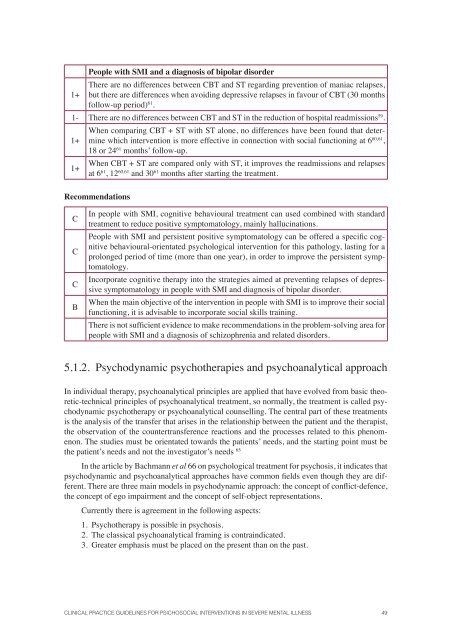CPG for Psychosocial Interventions in Severe Mental ... - GuÃaSalud
CPG for Psychosocial Interventions in Severe Mental ... - GuÃaSalud
CPG for Psychosocial Interventions in Severe Mental ... - GuÃaSalud
You also want an ePaper? Increase the reach of your titles
YUMPU automatically turns print PDFs into web optimized ePapers that Google loves.
People with SMI and a diagnosis of bipolar disorder<br />
There are no differences between CBT and ST regard<strong>in</strong>g prevention of maniac relapses,<br />
1+ but there are differences when avoid<strong>in</strong>g depressive relapses <strong>in</strong> favour of CBT (30 months<br />
follow-up period) 61 .<br />
1- There are no differences between CBT and ST <strong>in</strong> the reduction of hospital readmissions 59 .<br />
1+<br />
1+<br />
When compar<strong>in</strong>g CBT + ST with ST alone, no differences have been found that determ<strong>in</strong>e<br />
which <strong>in</strong>tervention is more effective <strong>in</strong> connection with social function<strong>in</strong>g at 6 60,61 ,<br />
18 or 24 61 months’ follow-up.<br />
When CBT + ST are compared only with ST, it improves the readmissions and relapses<br />
at 6 61 , 12 60,61 and 30 61 months after start<strong>in</strong>g the treatment.<br />
Recommendations<br />
C<br />
C<br />
C<br />
B<br />
In people with SMI, cognitive behavioural treatment can used comb<strong>in</strong>ed with standard<br />
treatment to reduce positive symptomatology, ma<strong>in</strong>ly halluc<strong>in</strong>ations.<br />
People with SMI and persistent positive symptomatology can be offered a specific cognitive<br />
behavioural-orientated psychological <strong>in</strong>tervention <strong>for</strong> this pathology, last<strong>in</strong>g <strong>for</strong> a<br />
prolonged period of time (more than one year), <strong>in</strong> order to improve the persistent symptomatology.<br />
Incorporate cognitive therapy <strong>in</strong>to the strategies aimed at prevent<strong>in</strong>g relapses of depressive<br />
symptomatology <strong>in</strong> people with SMI and diagnosis of bipolar disorder.<br />
When the ma<strong>in</strong> objective of the <strong>in</strong>tervention <strong>in</strong> people with SMI is to improve their social<br />
function<strong>in</strong>g, it is advisable to <strong>in</strong>corporate social skills tra<strong>in</strong><strong>in</strong>g.<br />
There is not sufficient evidence to make recommendations <strong>in</strong> the problem-solv<strong>in</strong>g area <strong>for</strong><br />
people with SMI and a diagnosis of schizophrenia and related disorders.<br />
5.1.2. Psychodynamic psychotherapies and psychoanalytical approach<br />
In <strong>in</strong>dividual therapy, psychoanalytical pr<strong>in</strong>ciples are applied that have evolved from basic theoretic-technical<br />
pr<strong>in</strong>ciples of psychoanalytical treatment, so normally, the treatment is called psychodynamic<br />
psychotherapy or psychoanalytical counsell<strong>in</strong>g. The central part of these treatments<br />
is the analysis of the transfer that arises <strong>in</strong> the relationship between the patient and the therapist,<br />
the observation of the countertransference reactions and the processes related to this phenomenon.<br />
The studies must be orientated towards the patients’ needs, and the start<strong>in</strong>g po<strong>in</strong>t must be<br />
the patient’s needs and not the <strong>in</strong>vestigator’s needs 65<br />
In the article by Bachmann et al 66 on psychological treatment <strong>for</strong> psychosis, it <strong>in</strong>dicates that<br />
psychodynamic and psychoanalytical approaches have common fields even though they are different.<br />
There are three ma<strong>in</strong> models <strong>in</strong> psychodynamic approach: the concept of conflict-defence,<br />
the concept of ego impairment and the concept of self-object representations.<br />
Currently there is agreement <strong>in</strong> the follow<strong>in</strong>g aspects:<br />
1. Psychotherapy is possible <strong>in</strong> psychosis.<br />
2. The classical psychoanalytical fram<strong>in</strong>g is contra<strong>in</strong>dicated.<br />
3. Greater emphasis must be placed on the present than on the past.<br />
CLINICAL PRACTICE GUIDELINES FOR PSICHOSOCIAL INTERVENTIONS IN SEVERE MENTAL ILLNESS 49

















